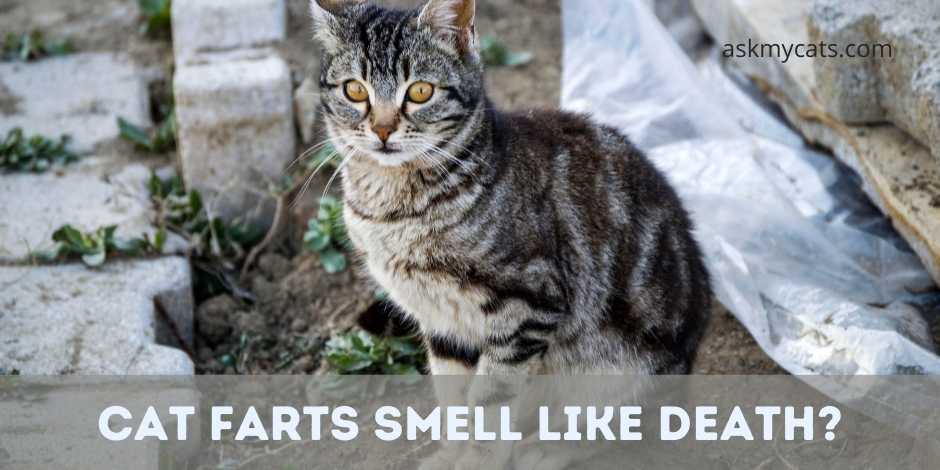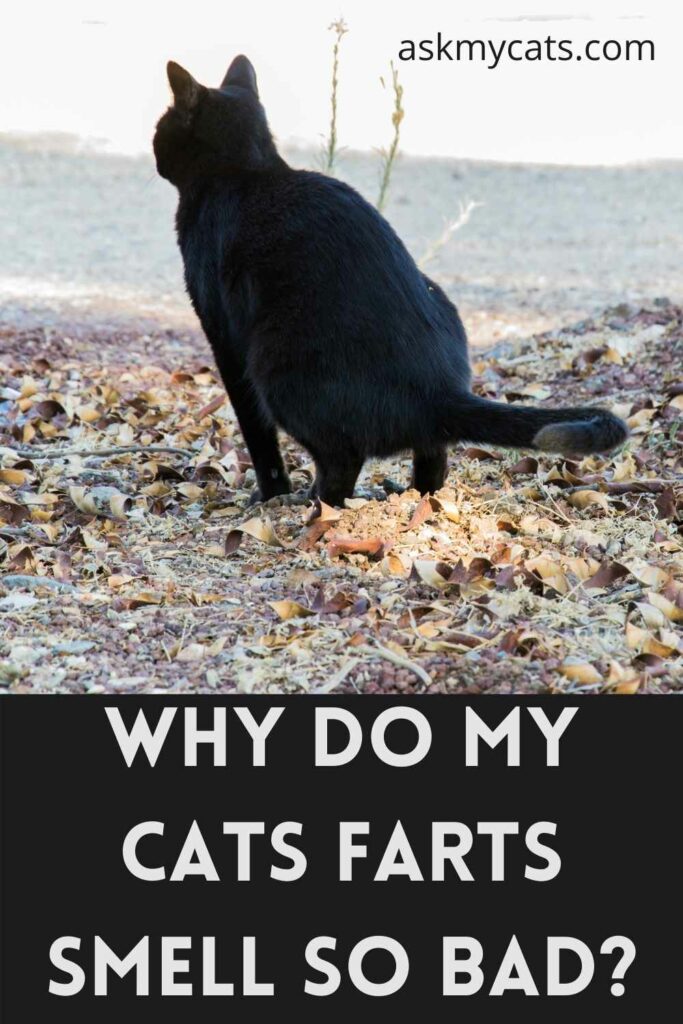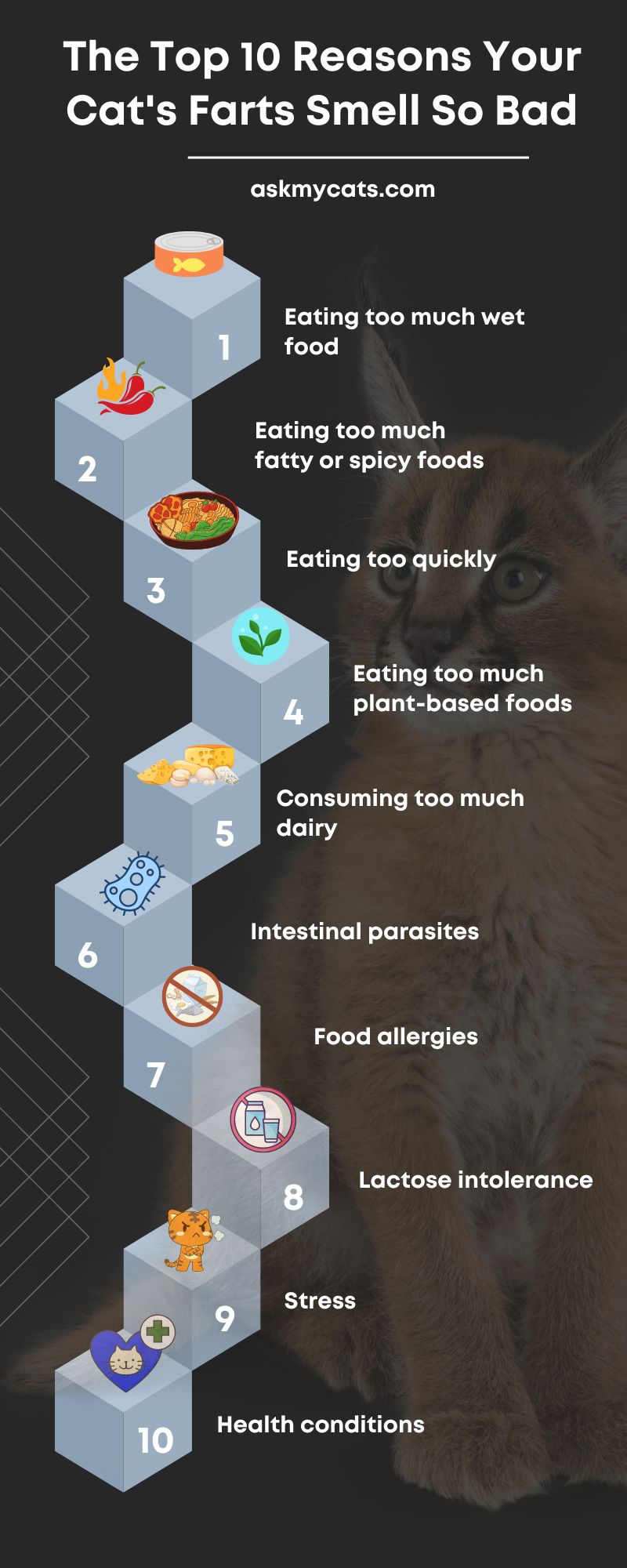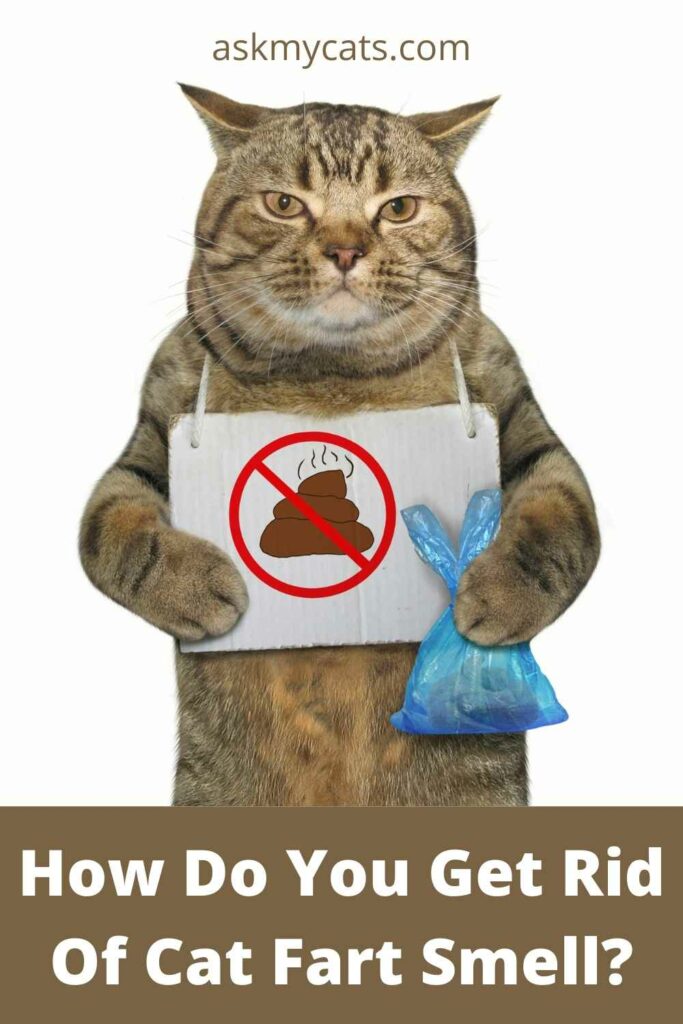Have you ever walked into a room and been hit with the overwhelming stench of cat fart? If so, you’re not alone.
It’s a common complaint among cat owners and one that many of us have wondered about. But have you ever stopped to think about why cat farts smell so bad?
It’s not just the stench that’s baffling, it’s the fact that our feline friends are so small and cute – you’d think their farts would be just as adorable. But no, it’s quite the opposite.
So, in this article, we’re going to take a deep dive into the smelly world of cat farts and figure out just why they smell so terrible. So grab a nose plug (just in case) and let’s get started.
Key Takeaways
- Cat farts smell bad because of their diet and digestion. Cats are obligate carnivores and require a diet high in protein, which when broken down by the body releases stinky sulfur compounds.
- Health issues such as inflammatory bowel disease (IBD) and intestinal parasites can also contribute to the smell and frequency of cat farts.
- Anal glands, which are located near a cat’s anus, can also cause smelly farts if they become clogged or infected.
- Consult with a veterinarian to rule out any underlying medical conditions that could be making the farts worse.


Give Your Cat the Perfect Day
Get the Free Ebook!
The Science of Farting in Cats
When it comes to the science of farting in cats, it all starts with the digestive process. Just like with humans and other animals, the food that cats eat needs to be broken down and processed by their digestive system before it can be used as energy.
During this process, certain types of food can cause more gas to be produced. For example, a diet that is high in carbohydrates or fibers can lead to more flatulence.
Also, if your cat has an underlying medical condition like inflammatory bowel disease (IBD) or food allergies this can contribute to the frequency and smell of their flatulence.
Here’s something interesting – did you know that, unlike humans, cats are obligate carnivores?
This means that their bodies are specifically designed to digest meat and animal protein, which is why they don’t have as much of an issue with gas as herbivores or omnivores do. However, cats also love to nibble on plants, and that’s where things can get smelly.
So, next time you notice your cat passing gas, you can blame it on the carbs and fibers! But also, it’s a good idea to check with your veterinarian to rule out any underlying medical condition that could be making it worse.
Expert Quote
“Certain diets, particularly those high in carbohydrates or fiber, can lead to more flatulence in cats.”
Dr. Elizabeth Arledge, a veterinarian at the CATalyst Council
Why Do My Cats Farts Smell So Bad?
Smelly cat farts are most commonly caused by your cat swallowing too much air, but they can also be caused by allergies or diet.

1. Diet and digestion
Cats are obligate carnivores, which means they require a diet high in protein to thrive. While this is great for their muscles and overall health, it can also lead to some stinky side effects.
You see, when cats consume a lot of protein, their bodies start to break it down into amino acids.
Some of these amino acids, like methionine and cysteine, contain sulfur. And when that sulfur gets broken down even further, it releases stinky sulfur compounds.
So, if your feline friend is eating a diet that’s heavy on protein, it could be the reason why their farts smell like rotten eggs. And, unfortunately, there’s no way to avoid this completely – their bodies need that protein to survive!
Expert Quote
“Cats are known to be fastidious animals, and their digestive systems are finely tuned to process animal-based proteins. When they consume a diet that is not well-suited to their biology, it can lead to digestive issues like flatulence.”
Dr. Sarah Brown, DVM, feline veterinarian
2. Health issues
Sometimes, that stinky gas isn’t just a result of their diet. Just like us, cats can develop health issues that lead to increased flatulence.
One common issue is inflammatory bowel disease (IBD). Just like it sounds, this is when the lining of a cat’s gut becomes inflamed and irritated, leading to symptoms like vomiting, diarrhea, and yes, even more gas than usual.
Another issue that can cause increased gas is intestinal parasites, such as worms. These little critters can disrupt the normal functioning of a cat’s digestive system and lead to an increase in gas production.
3. Anal glands
Now, you may be thinking, “Wait a minute, cats have anal glands? What do they do?” Well, they do and they play a pretty important role in a cat’s life.
You see, cats have two small glands located on either side of their anus that produce a strong-smelling scent to mark their territory.
However, sometimes these glands can become blocked or infected, which can cause some major problems.
When that happens, the scent they produce can become extremely foul-smelling, and it can make your cat’s flatulence smell like something you’d never want to sniff again.
But it’s not only the flatulence if those glands are not properly expressed, the secretion could also be accumulated inside and makes the cat uncomfortable and could develop an abscess that needs veterinary attention.
You might also like to check out Why Does My Kitten Fart So Much?

Chemicals That Makeup Cat Fart Odor
You see, a cat’s flatulence is caused by a variety of factors, including their diet, digestion, and overall health. However, the most important factor in determining the smell of a cat fart is the specific chemicals that are present.
One of the main chemicals responsible for the smell of a cat fart is methane. Methane is a colorless, odorless gas that is produced in the gut during the process of digestion.
However, when it is mixed with other chemicals, it can produce a strong, unpleasant odor.
Another chemical that contributes to the smell of a cat fart is sulfur. Sulfur is a naturally occurring element that is found in many foods, including certain types of protein. When it is metabolized by the body, it produces a gas called hydrogen sulfide, which has a strong, rotten egg-like odor.
Lastly, trace amounts of other volatile organic compounds are also present in the fart which may produce different types of smells like rotten eggs or even skunk-like odors.
All in all, the combination of these chemicals creates the unique and often pungent aroma that is associated with a cat fart. So, next time your feline friend lets one rip, just remember that it’s not their fault – it’s all in the chemistry!
Statistics Alert
A study published in the Journal of Feline Medicine and Surgery found that 15% of cats seen by veterinarians had flatulence as a symptom.
Journal of Feline Medicine and Surgery
You would also like to read about Do Cats Fart When They Are Scared, Excited, Or Happy?
Why Do My Cats Farts Smell Like Rotten Eggs?
It’s totally normal for cats to fart, just like us humans! And just like us, the smell of their gas can vary depending on what they’ve been eating. One of the reasons why your cat’s farts may smell like rotten eggs is that they contain sulfur.
Sulfur is a compound that is found in many proteins, and when it’s broken down by gut bacteria, it can produce a gas that has a distinct rotten egg smell.
Some cat foods, particularly those that contain a lot of fish or eggs, can be high in sulfur-containing amino acids. When your cat digests these foods, their gut bacteria produce gas that has a strong sulfur smell.
Another reason why your cat’s farts may smell like rotten eggs could be related to their digestive health. Some cats may have an increased amount of gut bacteria or may have an underlying gastrointestinal condition that causes them to produce more gas.
It’s worth noting that if you notice that your cat is having excessive flatulence, or if their farts are accompanied by other symptoms like diarrhea or vomiting, it’s best to consult with your veterinarian to rule out any underlying health issues.
But in most cases, it’s totally normal for cats to have a little bit of stinky gas here and there.
Study Alert
According to a survey by the Association for Pet Obesity Prevention, 57% of cats in the United States are overweight or obese which increases the chances of them having flatulence and bad smelling farts.
Association for Pet Obesity Prevention
Check out Do Cats Fart? Is It Normal For Cats To Fart?
Types Of Cat Food And Their Potential Impact On Flatulence
| Type of Cat Food | Description | Impact on Flatulence |
|---|---|---|
| Dry food | Typically made with high-carbohydrates and low-moisture | Can lead to increased flatulence and a stronger odor due to the high carbohydrate content |
| Canned food | Typically made with higher moisture content and fewer carbohydrates | Can reduce flatulence and odor due to the high moisture content and lower carbohydrate content |
| Fresh food | Homemade food made with high-quality ingredients | Can reduce flatulence and odor due to the high quality of ingredients and lack of fillers and preservatives |
| Raw food | Consists of uncooked meat, fruits, and vegetables | Can reduce flatulence and odor due to the lack of fillers and preservatives, but it may require careful handling and preparation to ensure food safety. |
| Freeze-dried food | Food that has been frozen and then dried to remove moisture | Can reduce flatulence and odor due to the lack of fillers and preservatives, but it may be more expensive than other types of food. |
| Dehydrated food | Food that has been dried to remove moisture | Can reduce flatulence and odor due to the lack of fillers and preservatives, but it may be more expensive than other types of food. |
Important Note
Please note that all cats have different nutritional needs and preferences, so it’s always best to consult with your veterinarian to determine the best type of food for your cat.
How to Minimize Cat Fart Odor?
If your cat farts more than you think is normal, it might be suffering from a digestive problem. Treatments will differ depending on the underlying cause of the gas.

1. Change In Diet
The first thing to keep in mind is that a lot of it comes down to diet. As mentioned earlier, a diet high in carbohydrates or fibers can lead to more flatulence, so if you’re looking to reduce the odor, it might be worth switching your cat to a different type of food.
You could try switching to a food that is high in protein, as it’s been mentioned earlier that the smell of farts produced by a high-protein diet is less pungent. Additionally, you could try wet food, as it’s more easily digestible and may produce less gas.
Another thing to consider is feeding your cat smaller, more frequent meals instead of one or two large meals.
This can help reduce the amount of gas they produce and also, avoid giving table scraps and human food as it could cause some stomach upsets or food allergies.
OUR Recommendation
No more smelly cats with our recommended cat food for gassy cats.
2. Eradicate Intestinal Parasites
If your cat has intestinal parasites, your veterinarian will prescribe medicine to kill the invaders. Some parasites are more difficult to get rid of than others.
There are over-the-counter dewormers available, but it’s impossible to tell if you’re getting the appropriate one because no medicine kills all parasites.
3. Treat Diseases
Gas can be caused by a variety of digestive problems. Dysbiosis, or a bacterial imbalance in the gut, is a frequent reason that can be helped with probiotics.
Cancers and inflammatory disorders are among the more severe diseases. In these situations, diarrhea, vomiting, and/or weight loss are frequently present along with flatulence, at least as the condition develops.
To battle the condition and its symptoms, medications may be administered, surgery may be advised, and specific diets may be considered to enhance the health of the digestive system.
4. Exercise
Provide your cat with plenty of toys and opportunities to run around and play. This can help keep their digestion regular, which can lead to less gas.
Also, Check out How To Choose Best Cat Food For Gassy Kitten
Frequently Asked Questions
Are stinky farts healthy?
Smelly gas is frequent and often misunderstood as normal. Excessively stinky farts might be caused by certain meals or medicines. However, stinky farts might be an indication of an underlying illness, digestive problems, or a disease in rare cases.
What foods make cats fart?
Food with high fiber content or too much red meat is two foods that cause flatulence in cats. Eating damaged or trashed food can also cause gas. Dairy products create flatulence in many cats that can’t digest them.
Do cats fart out loud?
Cat farts are an essential issue for pet parents to understand, even if it isn’t the ideal topic for the dinner table. Flatulence, like other gastrointestinal processes, is a normal occurrence in animals. The dignified cat does pass gas, albeit not as frequently (or as noisily) as dogs and people.
Final Words
Common ailments related to odor include abscesses and oral or dental disorders. Animals’ urine and excrement are typical causes of odor.
Cats may be soiling themselves owing to urine or fecal incontinence, or they may be unable to remove it from their hair coat due to a lack of grooming skills.
Feel free to drop your questions in the comments section below!
Interesting Read: Pregnant Cat Farting A Lot: Reasons & Solutions
